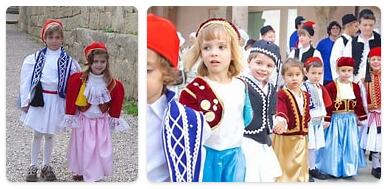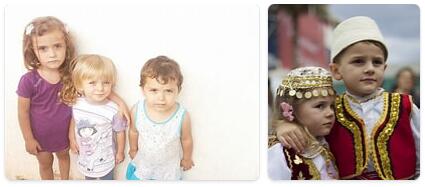Greece 2014
Yearbook 2014
Greece. A weak recovery began after the six-year-long and very deep decline in Greece. A turning point came in April when, for the first time in four years, the government was able to borrow with its own bonds. The fact that Greek government securities could attract investors was seen as a clear sign that the crisis was about to erode.
During the third quarter of the year, the economy grew by 0.7%, thus establishing that the recession was formally over. Unemployment was found to have fallen to 22%, a fall from the peak of over 26%. But the worry was far from over. At the end of the year, central government debt was still expected to be 175% of GDP, and when Prime Minister Antonis Samaras said in October that Greece would now manage on its own in the commercial loan market, the financial market got a hiccup.
Politically, the situation also remained unstable, with weak support for the fragile coalition government. Great popular dissatisfaction over stinging cuts was behind strikes and sometimes violent protests. In the municipal elections and the simultaneous EU elections in May, the Conservative government party backed New Democracy and the largest instead became the left party Syriza, who was a sharp critic of the austerity policy. The neo-Nazi Golden Dawn also progressed strongly and became the third largest party with over 9% of the vote. Syria’s leaders called the EU election a “referendum on austerity”.
After the elections, in early June, Samaras re-furnished his government and appointed a dozen new ministers. Among other things, Gikas Hardouvelis was appointed as the country’s sixth finance minister since the debt crisis erupted. In October, Samaras survived by a narrow margin a vote of confidence which he called for seeking support for his policy.
The authorities seized on two occasions in June a total of over two tons of heroin in what was described as the largest seizure of the drug to date in Europe. About 25 people were arrested in connection with the operation.
In December, it was decided to postpone the presidential election, so that before the end of the year Parliament was expected to appoint a new head of state. It was considered a political venture: if Samara’s candidate were not elected, he would be forced to announce new elections to Parliament. A possible victory for the left-wing Syriza would jeopardize continued loans from the EU, as the party opposed the terms. The announcement of an early presidential election triggered a sharp stock market fall.

Greece population in 2020 is estimated at 10,423,065. One of Greece’s most wanted people, left-wing extremist Nikos Maziotis, who was a member of the anarchist group Revolutionary Struggle, was arrested by police in July following a firefight in Athens. Maziotis had departed after being released conditional on prison in 2012. In July, Golden Dawn spokesman Ilias Kasidiaris was also arrested, suspected of unlawful weapons possession and belonging to a criminal organization. Kasidiaris had taken over when party leader Nikolaos Michaloliakos was jailed the year before. A prosecutor was reported to seek prosecution for a total of 70 of the party’s members, including all 18 members of parliament, for, among other things, murder. Nine of the parliamentarians were already in custody and others in house arrest.
Following pressures from abroad, in September, Parliament passed a new, stricter anti-racist law, which included sharpened the penalty for hate crimes and made it forbidden to deny the Holocaust. The background was Golden Dawn’s advance.
According to topb2bwebsites, during excavations in Amphipolis in the north, archaeologists found what was reported to be the largest ancient burial ground in Greece. Particular attention was given to a richly ornate tomb from the 300s BC. with remnants of a very influential person – it was wondered if it was one of Alexander the Great’s closest.
October
Squeak in the relationship with Azerbaijan
October 8
Greece and Azerbaijan are summoning their ambassadors to each country for consultations. The background is the conflict between Armenia and Azerbaijan over the Nagorno-Karabakh mountain range. Azerbaijan, backed by Turkey, claims that Greek citizens are taking part in the fighting on Armenia’s side and asks the Greek government to investigate.
The golden layer of dawn is sentenced to prison
October 7
A court in Athens finds that the leader of the far-right Golden Dawn party Nikos Michaloliakos and other leading figures within the party are guilty of leading a criminal organization. A total of 69 people are on trial in the case, which has been going on for five years. Michaloliakos and five of his closest men, including EU parliamentarian Ioannis Lagos, deputy party leader Christos Pappas and former party spokesman Ilias Kassidiaris will be sentenced to 13 years in prison. A total of 50 people are convicted of various crimes, including murder, assault and possession of a weapon. The background to the trial is the murder of the 34-year-old anti-fascist rapper Pavlov Fyssas in 2013. Fyssos was chased by a group of members at Golden Dawn before he was stabbed to death outside a café in a suburb of Athens. The assassination caused an outcry among the Greeks. Among the accused are Fysso’s murderer, the former truck driver Yiorgos Roupakias, who is sentenced to life in prison. Golden Dawn was at the top of its path after the parliamentary elections in 2012 and entered parliament also in 2015, but then lost support and did not pass the barrier in the 2019 elections.
Turkish retreat is followed by new advances in the eastern Mediterranean
5 October
Turkey is taking back the oil rig Yavuz from disputed waters near Cyprus after EU heads of state and government threatened Turkey with sanctions, but the peace will not last long. Ten days later, on October 14, the Turkish Minister of Energy announces that the research vessel Oruc Reis has regained its position south of the Greek island of Kastellorizo and has begun new measurements. Oruc Reis was called home from the area in mid-September. Germany and the United States are urging Turkey to take the ship home again and Greece says it will not consider any diplomatic solutions to the conflict as long as Oruc Reis is in the area.
September
Greece and Turkey establish hotline
September 25
According to NATO, military commanders from Greece and Turkey have set up a so-called hotline to simplify direct communication on military issues. The countries have held several talks in recent weeks to set up a mechanism to prevent a military conflict from being triggered by mistake, a risk that has increased due to the two countries holding several military exercises in the eastern Mediterranean. Tensions in the area have increased as a result of the dispute over the right to any energy resources there. Germany, as chair of the EU Council of Ministers, has also recently succeeded in getting both Greece and Turkey to join talks to resolve the underlying problems through diplomatic channels.
Turkey extends test drilling outside Cyprus
16 September
Turkey announces that it will allow the Yavuz vessel to continue test drilling for oil and gas in the sea off the coast of Cyprus until 12 October. Prime Minister Mitsotakis expresses strong concern over the announcement. Cypriot President Nicos Anastasiades, in turn, says the government is ready to hold talks with Turkey to find ways to resolve the escalating conflict between the two countries.
Germany wants to receive 1,500 migrants from Greek islands
September 14
The German government plans to receive 1,500 vulnerable migrants from Lesbos and other Greek islands. This is stated by the news agency AFP after having had contact with government sources. Germany has already promised to receive a number of unaccompanied children and young people from the ruined Moria.
Turkish research vessel leaves the eastern Mediterranean
September 13
The Turkish research vessel Oruc Reis, which was on disputed waters near the Greek island of Kastellorizo, returns to Turkey. Prime Minister Mitsotakis is pleased that the Turkish government is not extending Oruc Reis’ mandate and sees it as a first positive step in reducing tensions between the two countries. The vessel’s exploration for oil and gas in the eastern Mediterranean has been going on for a few weeks as planned. But the operation has been met with sharp protests from the Greek government and the EU and also led to military exercises being held. A first round of talks between delegations from Greece and Turkey was held a few days ago at NATO Headquarters in Brussels. The leaders of seven EU countries in the Mediterranean, France, Italy, Portugal, Spain, Malta, Greece and Cyprus, also recently met on the French island of Corsica,
Mitsotakis wants to build a new migrant clinic on Lesbos
September 13
After the overcrowded and controversial Moria refugee camp on Lesbos was destroyed by fires, Prime Minister Mitsotakis promises that a new reception center will be built. At a press conference, he said that the situation was an opportunity for the EU to find a solution to the migrant problems. He believes that “Europe should be much more involved in governing a new center”. Several thousand people have been given temporary accommodation after the fires and ten EU countries have promised to receive a total of 400 unaccompanied minor migrants, including France and Germany, each of whom receives between 100 and 150 children.
Fire in refugee camp on Lesbos
September 9th
Two fires break out in the Moria refugee camp on the island of Lesbos. The camp is Greece’s largest; over 12,000 people are crowded there in buildings intended for just under 3,000. The first fire was discovered after about 30 camp residents did tests that showed that they carried the coronavirus. There are suspicions that the fire was started. More than 3,000 of the camp’s residents become homeless and lose their belongings in the fire. Later, another fire breaks out in another part of the camp. The authorities declare a state of emergency on the island. The EU promises crisis aid to Greece and Germany, which holds the presidency of the EU Council of Ministers, is pushing for members to agree on a new asylum management system.
August
Greece will expand territorial waters
August 27th
Prime Minister Kyriakos Mitsotakis informs Parliament that Greece plans to expand its territorial waters to the west from 6-12 nautical miles in the Ionian Sea. According to Mitsotakis, there are also plans to eventually expand territorial waters elsewhere. The plot is part of the growing conflict with arch-enemy Turkey over possible gas deposits in the Aegean Sea.
Military exercise in the eastern Mediterranean
August 26th
Greece will hold military exercises in the eastern Mediterranean along with Cyprus, France and Italy. The exercises will last for three days and they will be carried out in the light of the recent conflict with Turkey. Tensions have been raised following the discovery of gas deposits off Cyprus and in the sea near Greek Crete. The conflict has recently escalated after Turkey sent the research vessel Oruc Reis to search for energy deposits in disputed sea areas.
Turkish gas search “threatens peace”
10th August
The Greek government criticizes Turkey for its search for oil and gas in the sea near Greek islands “threatening peace”. Turkey has resumed exploration near the Greek island of Kastellorizo and is using a research vessel with special equipment for the purpose. The ship is escorted by five warships. In July, Turkey promised to suspend the search so that negotiations could take place after German Chancellor Angela Merkel asked for it. But the Greek-Egyptian agreement in early August to form a common economic zone in the eastern Mediterranean is leading to Turkish anger and a resumption of oil and gas exploration. The Greek government is now demanding that the Turkish ship be taken home immediately, and Prime Minister Mitsotakis has called for an extra EU meeting to discuss Turkey’s.
Greece and Egypt agree on sea zone
August 6th
Greece and Egypt conclude agreements to form a common economic zone in the eastern Mediterranean. The cooperation will include oil and gas that can be extracted in the area, according to the Egyptian Foreign Minister. The agreement must be seen in the light of an ongoing race for marine resources. Last year, Turkey signed an agreement with the Libyan government in Tripoli, also on natural resources in the eastern Mediterranean. That deal, and Turkish exploration at sea, also worries Cyprus.


